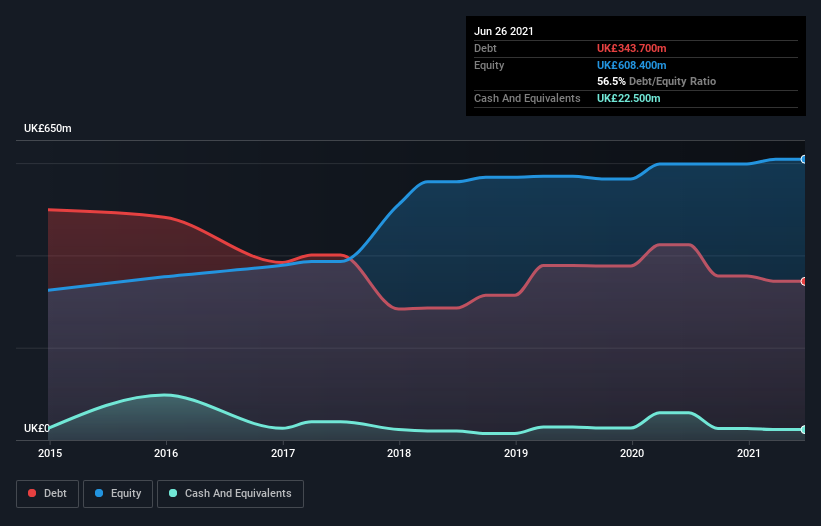- United Kingdom
- /
- Food
- /
- LSE:BAKK
These 4 Measures Indicate That Bakkavor Group (LON:BAKK) Is Using Debt Extensively

The external fund manager backed by Berkshire Hathaway's Charlie Munger, Li Lu, makes no bones about it when he says 'The biggest investment risk is not the volatility of prices, but whether you will suffer a permanent loss of capital.' When we think about how risky a company is, we always like to look at its use of debt, since debt overload can lead to ruin. Importantly, Bakkavor Group plc (LON:BAKK) does carry debt. But the more important question is: how much risk is that debt creating?
When Is Debt Dangerous?
Debt is a tool to help businesses grow, but if a business is incapable of paying off its lenders, then it exists at their mercy. In the worst case scenario, a company can go bankrupt if it cannot pay its creditors. However, a more frequent (but still costly) occurrence is where a company must issue shares at bargain-basement prices, permanently diluting shareholders, just to shore up its balance sheet. Of course, plenty of companies use debt to fund growth, without any negative consequences. The first thing to do when considering how much debt a business uses is to look at its cash and debt together.
View our latest analysis for Bakkavor Group
What Is Bakkavor Group's Debt?
You can click the graphic below for the historical numbers, but it shows that Bakkavor Group had UK£343.7m of debt in June 2021, down from UK£422.9m, one year before. However, it does have UK£22.5m in cash offsetting this, leading to net debt of about UK£321.2m.

How Healthy Is Bakkavor Group's Balance Sheet?
We can see from the most recent balance sheet that Bakkavor Group had liabilities of UK£405.7m falling due within a year, and liabilities of UK£440.8m due beyond that. Offsetting these obligations, it had cash of UK£22.5m as well as receivables valued at UK£128.5m due within 12 months. So its liabilities total UK£695.5m more than the combination of its cash and short-term receivables.
When you consider that this deficiency exceeds the company's UK£677.9m market capitalization, you might well be inclined to review the balance sheet intently. Hypothetically, extremely heavy dilution would be required if the company were forced to pay down its liabilities by raising capital at the current share price.
We use two main ratios to inform us about debt levels relative to earnings. The first is net debt divided by earnings before interest, tax, depreciation, and amortization (EBITDA), while the second is how many times its earnings before interest and tax (EBIT) covers its interest expense (or its interest cover, for short). Thus we consider debt relative to earnings both with and without depreciation and amortization expenses.
Bakkavor Group's net debt is sitting at a very reasonable 2.1 times its EBITDA, while its EBIT covered its interest expense just 5.6 times last year. While that doesn't worry us too much, it does suggest the interest payments are somewhat of a burden. Importantly, Bakkavor Group grew its EBIT by 33% over the last twelve months, and that growth will make it easier to handle its debt. There's no doubt that we learn most about debt from the balance sheet. But it is future earnings, more than anything, that will determine Bakkavor Group's ability to maintain a healthy balance sheet going forward. So if you're focused on the future you can check out this free report showing analyst profit forecasts.
Finally, a company can only pay off debt with cold hard cash, not accounting profits. So we clearly need to look at whether that EBIT is leading to corresponding free cash flow. In the last three years, Bakkavor Group's free cash flow amounted to 27% of its EBIT, less than we'd expect. That's not great, when it comes to paying down debt.
Our View
Neither Bakkavor Group's ability to handle its total liabilities nor its conversion of EBIT to free cash flow gave us confidence in its ability to take on more debt. But its EBIT growth rate tells a very different story, and suggests some resilience. We think that Bakkavor Group's debt does make it a bit risky, after considering the aforementioned data points together. That's not necessarily a bad thing, since leverage can boost returns on equity, but it is something to be aware of. When analysing debt levels, the balance sheet is the obvious place to start. But ultimately, every company can contain risks that exist outside of the balance sheet. For instance, we've identified 2 warning signs for Bakkavor Group that you should be aware of.
If you're interested in investing in businesses that can grow profits without the burden of debt, then check out this free list of growing businesses that have net cash on the balance sheet.
Valuation is complex, but we're here to simplify it.
Discover if Bakkavor Group might be undervalued or overvalued with our detailed analysis, featuring fair value estimates, potential risks, dividends, insider trades, and its financial condition.
Access Free AnalysisThis article by Simply Wall St is general in nature. We provide commentary based on historical data and analyst forecasts only using an unbiased methodology and our articles are not intended to be financial advice. It does not constitute a recommendation to buy or sell any stock, and does not take account of your objectives, or your financial situation. We aim to bring you long-term focused analysis driven by fundamental data. Note that our analysis may not factor in the latest price-sensitive company announcements or qualitative material. Simply Wall St has no position in any stocks mentioned.
Have feedback on this article? Concerned about the content? Get in touch with us directly. Alternatively, email editorial-team (at) simplywallst.com.
About LSE:BAKK
Bakkavor Group
Engages in the preparation and marketing of fresh prepared foods in the United Kingdom, the United States, and China.
Adequate balance sheet second-rate dividend payer.


